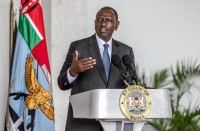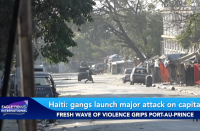Colombian President Juan Manuel Santos on Thursday (October 13) extended his ceasefire with Marxist FARC rebels through the end of the year as he seeks to revive a peace accord to end five decades of war after voters rejected the hard-fought deal in a referendum.
The original ceasefire, which was put in place in August, was nullified when the peace accord was rejected in plebiscite earlier this month. He had already extended it to October 31.
“I have made the decision to extend the bilateral ceasefire until December 31, but it must be clear that this is not an ultimatum, nor is it a deadline, but I hope that this whole process to produce a new agreement end long before this, because, as a student said to me today, time conspires against peace and life,” Santos announced in a recorded television address.
Santos said he decided to extend the ceasefire further after meeting with student leaders who had organized two huge marches through Bogota to show support for a peace accord.
The decision comes as Santos and his team hear proposals from representatives of those who voted against the accord – rejected by a razor-thin margin of less than half a percentage point – as too lenient on the Marxist rebels.
He will take the proposals to the FARC leadership in Havana, who have said they are willing to discuss new ideas.
The ceasefire can be extended further, but Santos said he hopes a new deal is approved long before then. Santos won the 2016 Nobel Peace Prize on Friday for his efforts to end the war.
“Compatriots, we will achieve it, we will manage to end this violence forever, for all those who have been displaced to return home, and create the opportunity, as everyone recognises, that with the country in peace, progress, development, and employment will reach all Colombians. We cannot miss this opportunity, and we will not,” Santos added.
Led by hardline former President Alvaro Uribe, the “No” side wants rebels who have committed war crimes to be confined for five to eight years – possibly on agricultural farms – and banned from elected office.
Uribe said on Thursday that he had discussed with government negotiators the possibility of these confinement zones being abroad.
“For perpetrators of serious crimes, we have been discussing – what we had said in congress – rural areas or concentration zones. We also spoke about the possibility of these penitentiary zones being abroad,” said Uribe.
Although the FARC leadership has said it is willing to hear new ideas, Uribe’s proposals may be difficult to accept, given they have repeatedly refused to consider jail time and want to form a political party.
(c) Copyright Thomson Reuters 2016







